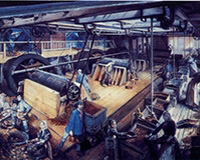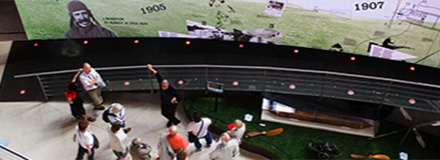Première saison du séminaire 2024-2025
La page principale de ce séminaire avec les informations mises à jour est sur github ; ou sur HT2S.
Ksenia Ermoshina et Boris Melnichenko (CIS, CNRS)
Une “Intelligence souveraine” ? Infrastructures, représentations et géopolitique de l’IA russe dans le contexte comparatif
Dans le cadre du projet ANR CulturIA, cette enquête porte sur l’histoire contemporaine de l’intelligence artificielle et ses aspects socio-culturels, notamment dans le monde russophone et ses rapports à l’international. Lire la suite.
Discutant : Benjamin Bürbaumer - Sciences Po Bordeaux
Barbara Hof - University of Lausanne (Suisse)
The present is boring, but the future is bright?! A transnational history of the introduction of computers in education since the 1960s
The arrival of new technologies in education has always been shaped by contradictory visions. Read more
Discutant : Ronan Le Roux (LIS, UPEC)
Théo Lepage-Richer, Université de Toronto (Canada) et Ranjodh Singh Dhaliwal, Université de Basel (Suisse) SEANCE BILINGUE ANGLAIS/FRANCAIS
Les réseaux de neurones : 100 ans de neurophysiologie technologisée
On revisite cinq moments clés de l’histoire de ce modèle pour reconstruire certaines des pratiques situées, des histoires sociales, des techniques de médiation et des présupposés ontologiques qui ont influencé la transformation récente des réseaux de neurones en modèle d’apprentissage automatique. Lire la suite.
Discutant: Valentin Goujon - médialab Sciences Po
Marie-José Durand-Richard - CNRS-Paris 7, SPHERE, en partenariat avec le Séminaire d'histoire de l'informatique (I. Astic, P.-E. Eric Mounier-Kuhn, P. Paradinas)
De la Pascaline à l’ordinateur : contribution à une approche contextualisée de la mécanisation du calcul
De nombreux instruments et machines, souvent élaborés en marge du milieu académique, ont jalonné la mécanisation du calcul jusqu'à l'ordinateur. Aussi bien leur conception que leur fabrication ont mobilisé bien d'autres acteurs que les seuls mathématiciens : artisans, ingénieurs, physiciens. Lire la suite
Discussant : Loïc Petitgirard (HT2S, Cnam)
Jaroslav Švelch - Charles University (République Tchèque)
Power to the clones: Hardware and software bricolage on the periphery
This talk will address the specifics of computing practices (both amateur and professional) in peripheral contexts. Its aim is to lift “clones”, “ports” and other “bastard” hardware and software artifacts from relative obscurity and derision up to the focus of the history of computing. I will approach the topic revisiting the classic concept of bricoleur, introduced by Lévi-Strauss as a counterpoint to engineer. Read More.
Discutant : Kévin Limonier - Université Paris-8 & Institut Français de Géopolitique
Cédric Neumann - Cnam, HT2S (salle 30 -1 20) - report de la séance annulée du 10 février
Socio-histoire de la construction managériale de l’informatique en France
Une socio-histoire de l’informatique doit réévaluer l’importance du management dans la généralisation de l’informatique et dans l’émergence des utilisateurs individuels. Lire la suite.
Discutant : Pierre Labardin (La Rochelle U.)
So.Hist-Info - Research seminar of the Socio-History of Informatics
See also our github page for updated info or the HT2S page.
-
1st session : October 14th, 2024, from 3 PM to 5 PM
Ksenia Ermoshina et Boris Melnichenko (Centre Internet et Society, CNRS)
A “Sovereign Intelligence”? Infrastructures, Representations, and Geopolitics of Russian AI: A Comparative Approach
As part of the ANR CulturIA project, this investigation focuses on the contemporary history of artificial intelligence and its socio-cultural aspects, particularly within the Russian-speaking world and its international relations. Read more.
Discussant : Benjamin Bürbaumer - Sciences Po Bordeaux
-
2nd session : December 16th, 2024, from 3 PM to 5 PM
Barbara Hof (University of Lausanne, Switzerland)
The present is boring, but the future is bright?! A transnational history of the introduction of computers in education since the 1960s
The arrival of new technologies in education has always been shaped by contradictory visions. Read more
Discussant : Ronan Le Roux (LIS, UPEC)
Théo Lepage-Richer, Université de Toronto (Canada) et Ranjodh Singh Dhaliwal, Université de Basel (Suisse) SEANCE BILINGUE ANGLAIS/FRANCAIS
Les réseaux de neurones : 100 ans de neurophysiologie technologisée
On revisite cinq moments clés de l’histoire de ce modèle pour reconstruire certaines des pratiques situées, des histoires sociales, des techniques de médiation et des présupposés ontologiques qui ont influencé la transformation récente des réseaux de neurones en modèle d’apprentissage automatique. Lire la suite.
Discussant: Valentin Goujon - médialab Sciences Po
Marie-José Durand-Richard (CNRS-Paris 7, SPHERE, France).
Session co-organized with the [History of Computing Seminar at the Musée des Arts et Métiers](https://museeinfo.cnam.fr/seminaires/).
Numerous instruments and machines, often developed on the fringes of the academic world, have marked the mechanization of calculation up to the computer. Both their design and manufacturing involved many other actors besides mathematicians alone: artisans, engineers, and physicists. Moreover, these collective research efforts had to generate sufficient socio-political interest to secure funding. Read more.
Discussant : Loïc Petitgirard (HT2S, Cnam)
-
5th session : April 14th 2025, 3-5pm
Jaroslav Švelch - Charles University (République Tchèque)
Power to the clones: Hardware and software bricolage on the periphery
This talk will address the specifics of computing practices (both amateur and professional) in peripheral contexts. Its aim is to lift “clones”, “ports” and other “bastard” hardware and software artifacts from relative obscurity and derision up to the focus of the history of computing. I will approach the topic revisiting the classic concept of bricoleur, introduced by Lévi-Strauss as a counterpoint to engineer. Read More.
Discussant : Kévin Limonier - Université Paris-8 & Institut Français de Géopolitique
-
6th session : June 16th 2025 10-12pm
Cédric Neumann - Cnam, HT2S (salle 30 -1 20) - report de la séance annulée du 10 février
Socio-history of the managerial construction of IT in France
Socio-history has been defined by G. Noiriel as the use of conceptual tools from sociology in historical investigations to denaturalize power relations by tracing their genesis and hidden origins. The current omnipresence of digital tools and how it can affect power relations—whether between the state and corporations or among employees through the redefinition of work, for example—has rarely been the subject of socio-historical analysis in the strict sense. Read more.
Discussant : Pierre Labardin (La Rochelle U.)
Organisation and contact
The seminar is organized by (in alphabetical order):
Mathilde Fichen mathilde.fichen [@] lecnam.net
Camille Paloque-Bergès camille.paloque-berges [@] lecnam.net
Adrien Tournier adrien.tournier [@] lecnam.net


